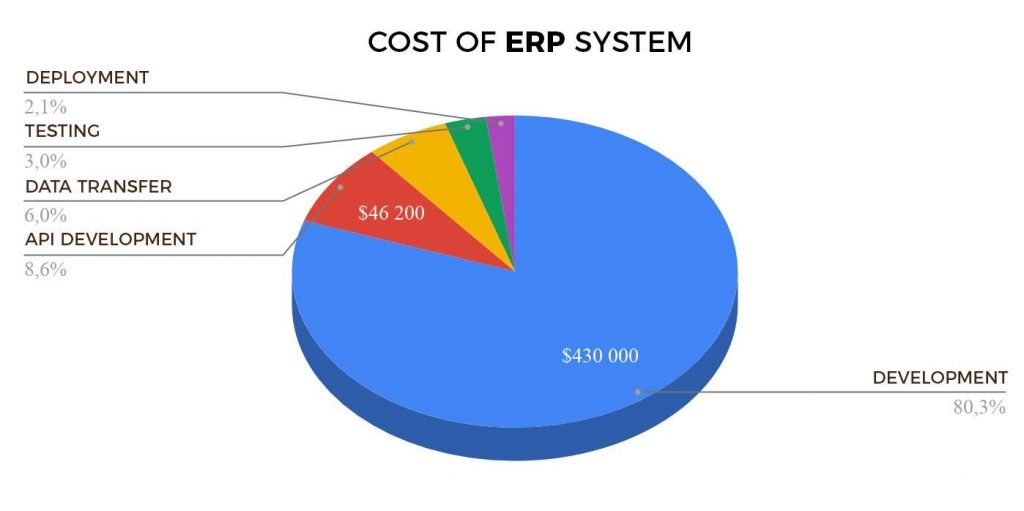
Why Should You Invest in an AI-Based ERP System?
Technology is evolving by the day; today’s latest technology may be replaced by something else tomorrow. Enterprise resource planning (ERP) for mid-sized and large corporations has been around for quite some time. ERP technology is not the same as when it was first introduced. Artificial intelligence (AI) is intruding on all spheres of life, no matter whether it is communication, customer support, transportation, or ERP.
This blog will closely examine why an AI-based ERP system is worth the investment.
AI is constantly getting better and becoming more capable of replacing humans. AI can also be used in ERP systems to make them faster and more automated.
The increasing complexity of business processes calls for an AI-based ERP system. So, let’s dive into the benefits of an AI-based ERP system.
7 Benefits of an AI-based ERP System
Businesses use ERP software to function more smoothly, and AI has further enhanced the software’s utility. An AI-based ERP system has many benefits, but we will go through the seven most important ones.
#1 Data Analytics

Manual data entry in big organizations can cost many man-hours and cause a heavy workload for employees. In addition, errors can creep in, which can be detrimental in the long run. An ERP system, augmented with AI, will create automated workflows, saving time by removing the need for people to enter data into the system.
#2 Process Automation
AI technology can help automate certain organizational processes and make intelligent decisions, as it can learn over time. Processes like accounting and payroll can be automated with the help of AI. AI can also detect inefficient processes and suggest measures that can cut costs and prevent the wastage of resources.
#3 User Experience
Learning to navigate a complex ERP can be a major challenge for businesses. If it is a new ERP that the executives are trying to learn from scratch, it can be a harrowing experience.
This is when AI technology incorporated into ERP can help. It can make intelligent decisions based on input from humans, making it faster and more responsive to users.
For example, when someone conducts a search on ERP, AI can customize results based on the user’s history, making it more efficient, faster, and simpler to use.
#4 Augmenting Employees
A major worry these days is that AI will replace humans in many jobs across the world. However, this is just one side of the coin. AI also brings a wide range of opportunities along with it. It not only opens up new roles and responsibilities but also augments existing positions.
AI-based ERP can arm employees with tools and insights to process data or perform other tasks at a speed and scale much larger than humans can manage. Thus, AI is an enhancer of human roles and not a replacer.
#5 Increases Productivity
AI takes over routine, low-value, or repetitive tasks that consume a lot of time. This allows employees to work on high-value tasks at lower costs, increasing productivity in the process.

ERP software providers can incorporate AI technology to simplify information access. This eliminates the need to go through complex menu options or remember codes to fetch information. Users can now use an AI interface to fetch the required data, no matter where it lies within the system. This can give a tremendous boost to productivity.
#6 Increases Adaptability
ERP systems integrated with AI can learn and adapt easily. As a business
evolves, AI algorithms constantly optimize processes, improve accuracy, and fine-tune recommendations.
So, whether you expand into new markets or revise your customer support approach, AI-based ERP systems have the scalability and adaptability to support your decisions.
#7 Cost Optimization
Last but not least, AI-based ERP software optimizes costs across your organization. It analyzes sales patterns and historical data and streamlines various processes, including inventory management, to reduce wastage.

All these cost-saving measures impact profitability and improve financial performance over time.
Having reviewed the benefits of using an AI-based ERP system, let’s look at some real-world use cases of the same by different vendors.
Vendors Integrating AI and ERP
With the increasing popularity of AI, every major ERP vendor claims to have integrated AI into ERP. It is difficult to verify all claims, but some vendors have made specific improvements to their ERP platform with the help of machine learning.
Microsoft: The firm incorporated AI into its ERP solution, Microsoft Dynamics AI. It has virtual agents and provides sales insights and customer service insights, making use of machine learning.
SAP: It has an ERP platform called S/4HANA Cloud, which is a real-time solution based on an advanced in-memory platform. It enables firms to make use of machine learning algorithms on their data.
NetSuite: The NetSuite Intelligent Cloud Suite provides better efficiency and better insights via the integration of predictive analytics.
Infor Coleman: This ERP solution provides a conversational user experience that makes use of chat, voice, and image-recognition capabilities.
Epicor Virtual Agent (EVA): It is a voice command user interface based on AI that is meant to improve productivity. It streamlines routine tasks like scheduling and quoting. Along with this, it provides recommendations based on data like defect detection in manufacturing.
Although AI-based ERP systems offer several benefits, there are some challenges that need to be addressed. We will go through them briefly.
Challenges of Incorporating AI in ERP
There are always two sides to a coin, so if there are benefits of AI-based ERP, there are
some challenges as well. Firms need to keep them in mind while using AI-based ERP.
- Firms need to train employees working with AI-based ERP to help them understand the insights received from its use.
- Combining AI with ERP requires accurate data mapping and synchronization, which ensures data accuracy and consistency across different modules of ERP.
- There can be compatibility issues at the time of integration due to the complexity of both the ERP system and AI solutions.
- Implementing an AI-based ERP requires significant investment in terms of infrastructure, tools, and manpower. Firms need to do a careful assessment of their ERP budget and ROI.
- As employees will need to adapt to new workflows and processes, there may be some resistance to change at first.
The Bottom Line…
Having reviewed the pros and cons of AI-based ERP, we can see that the benefits will far outweigh the challenges in the long run. So, investing in an AI-based ERP is a smart decision. With increasing business complexity, data needs, and customer expectations, you will lose to competitors if your ERP is not AI-enabled.
So, go for it and reap its benefits.
For your web design, development, and hosting requirements, get in touch with L Form.



